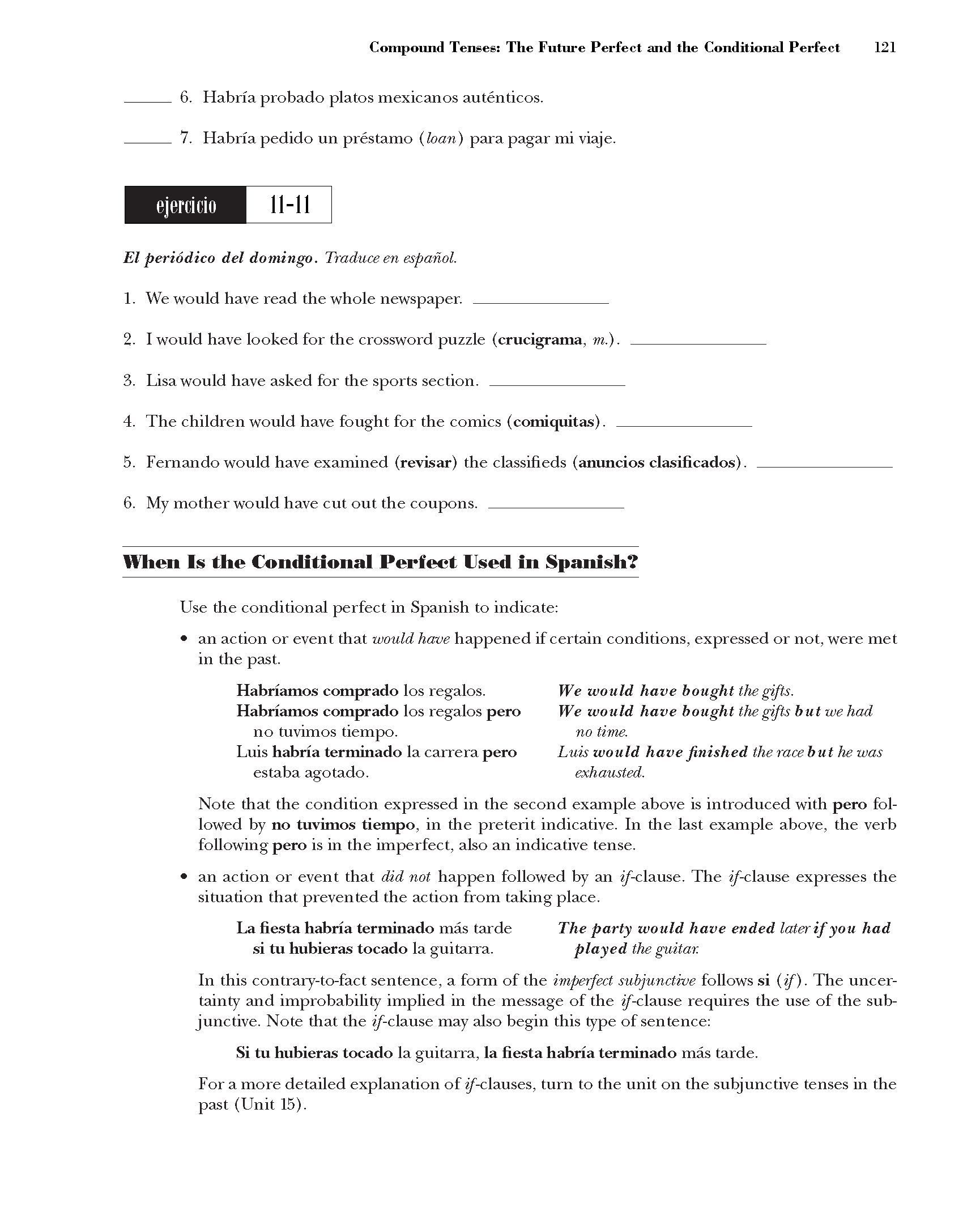CSG132

121
Compound Tenses: The Futurę Perfect and the Conditional Perfect
6. Habrfa probado platos mexicanos autenticos.
7. Habrfa pedido un prestamo {han) para pagar mi viaje.
ejercicio
El periódico del domingo. Traduce en espanol.
1. We would have read the whole newspaper. _
2. I would have looked for the crossword puzzle (crucigrama, m.). _
3. Lisa would have asked for the sports section. _
4. The children would have fought for the comics (comiquitas). _
5. Fernando would have examined (revisar) the classifieds (anuncios clasificados).
6. My mother would have cut out the coupons. _
Wlieii Is the Conditional Perfect Used in Spanisli?
Use the conditional perfect in Spanish to indicate:
• an action or event that would have happened if certain conditions, expressed or not, were met in the past.
Habriamos comprado los regalos. Habriamos comprado los regalos pero no tuvimos tiempo.
Luis habria terminado la carrera pero es taba ago tado.
We would have bought thegifts.
We would have bought thegifts but we had
no time.
Luis would have finished the race but he was
exhausted.
Notę that the condition expressed in the second example above is introduced with pero fol-lowed by no tuvimos tiempo, in the preterit indicative. In the last example above, the verb following pero is in the imperfect, also an indicative tense.
• an action or event that did not happen followed by an if-clause. The if-clause expresses the situation that prevented the action from taking place.
La fiesta habria terminado mas tar de The party would have ended laterif you had
si tu hubieras tocado la guitarra. played the guitar.
In this eontrary-to-fact sentence, a form of the imperfect subjunctive follows si {if). The uncer-tainty and improbability implied in the message of the if-clause requires the use of the sub-junctive. Notę that the if-clause may also begin this type of sentence:
Si tu hubieras tocado la guitarra, la fiesta habria terminado mas tarde.
For a morę detailed explanation of if-clauses, turn to the unit on the subjunctive tenses in the past (Unit 15).
Wyszukiwarka
Podobne podstrony:
CSG132 121 Compound Tenses: The Futurę Perfect and the Conditional Perfect 6. Habr
CSG132 121 Compound Tenses: The Futurę Perfect and the Conditional Perfect 6. Habr
CSG134 123 Compound Tenses: The Futurę Perfect and the Conditional PerfectOne Morę Use of the Condit
CSG128 Compound Tenses: The Futurę Perfect and the Conditional Perfect 117 11-3 ejercicio La duda. E
CSG130 119 Compound Tenses: The Futurę Perfect and the Conditional Perfect people? Cyberspace might
CSG134 123 Compound Tenses: The Futurę Perfect and the Conditional PerfectOne Morę Use of the Condit
CSG134 123 Compound Tenses: The Futurę Perfect and the Conditional PerfectOne Morę Use of the Condit
CSG120 Compound Tenses: The Present Perfect and the Past Perfect 109Wlieii Is the Present Perfect Te
CSG116 Compound Tenses: The Present Perfect and the Past Perfect 105 yo he nosotros/n oso
CSG118 107 Compound Tenses: The Present Perfect and the Past Perfect • Irregular past participles in
więcej podobnych podstron